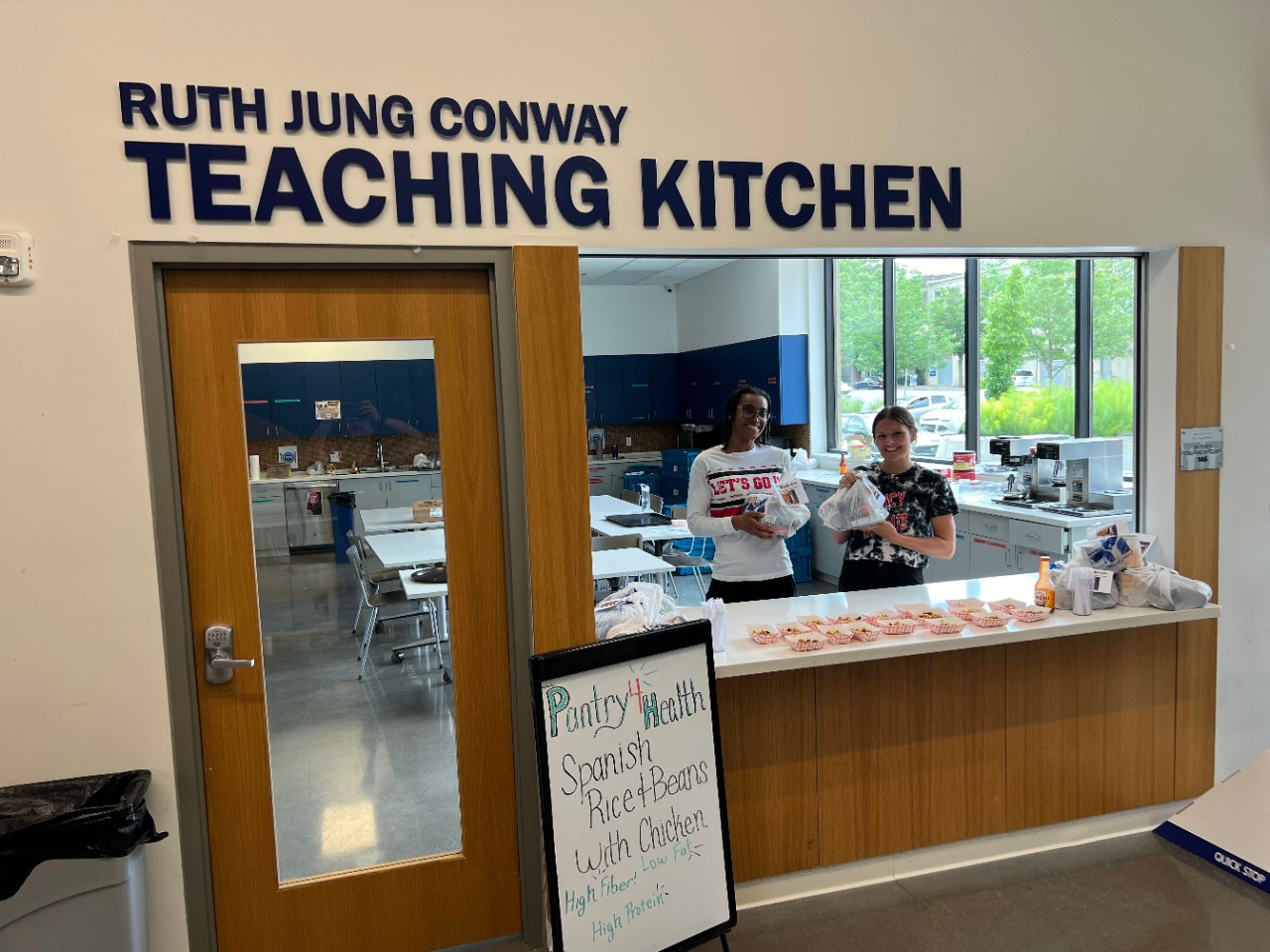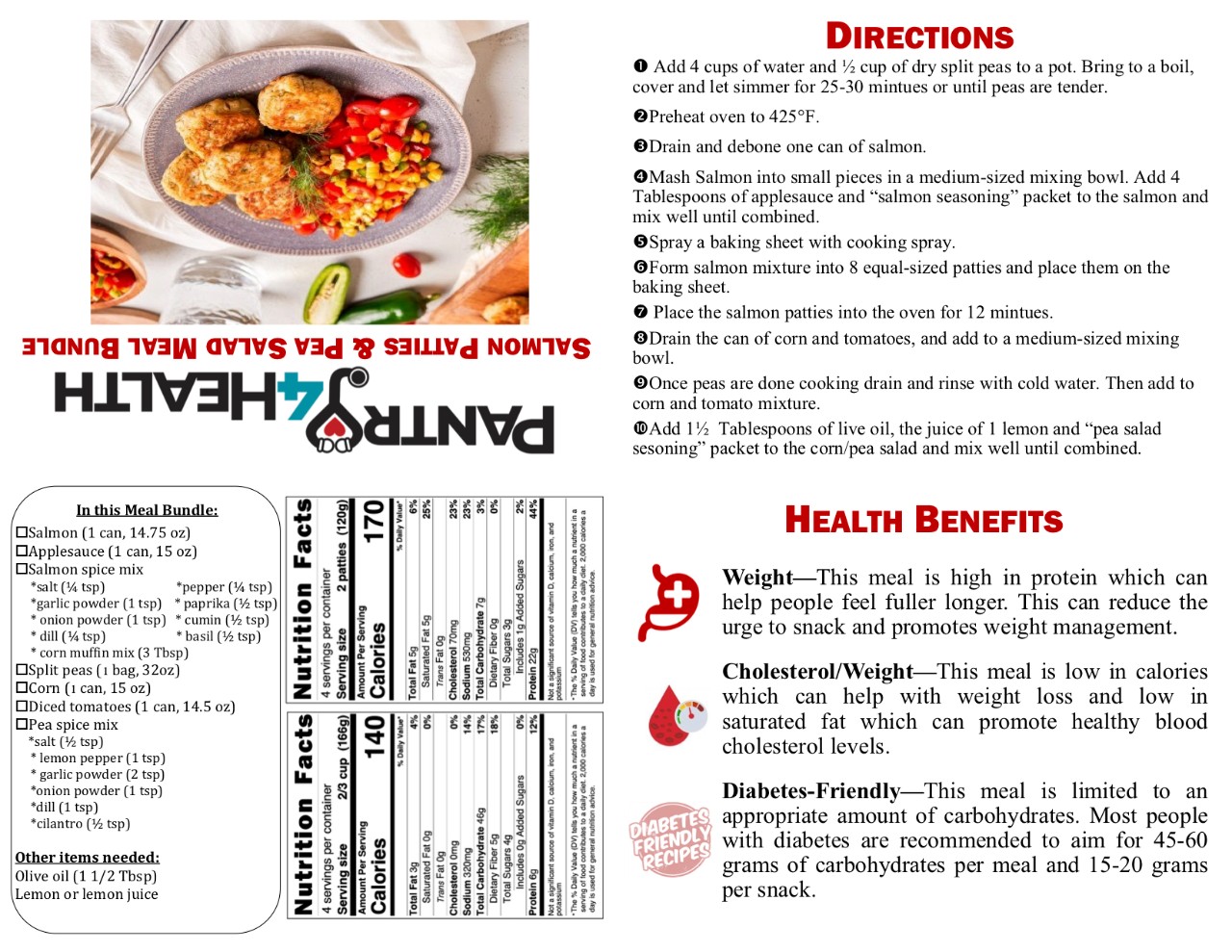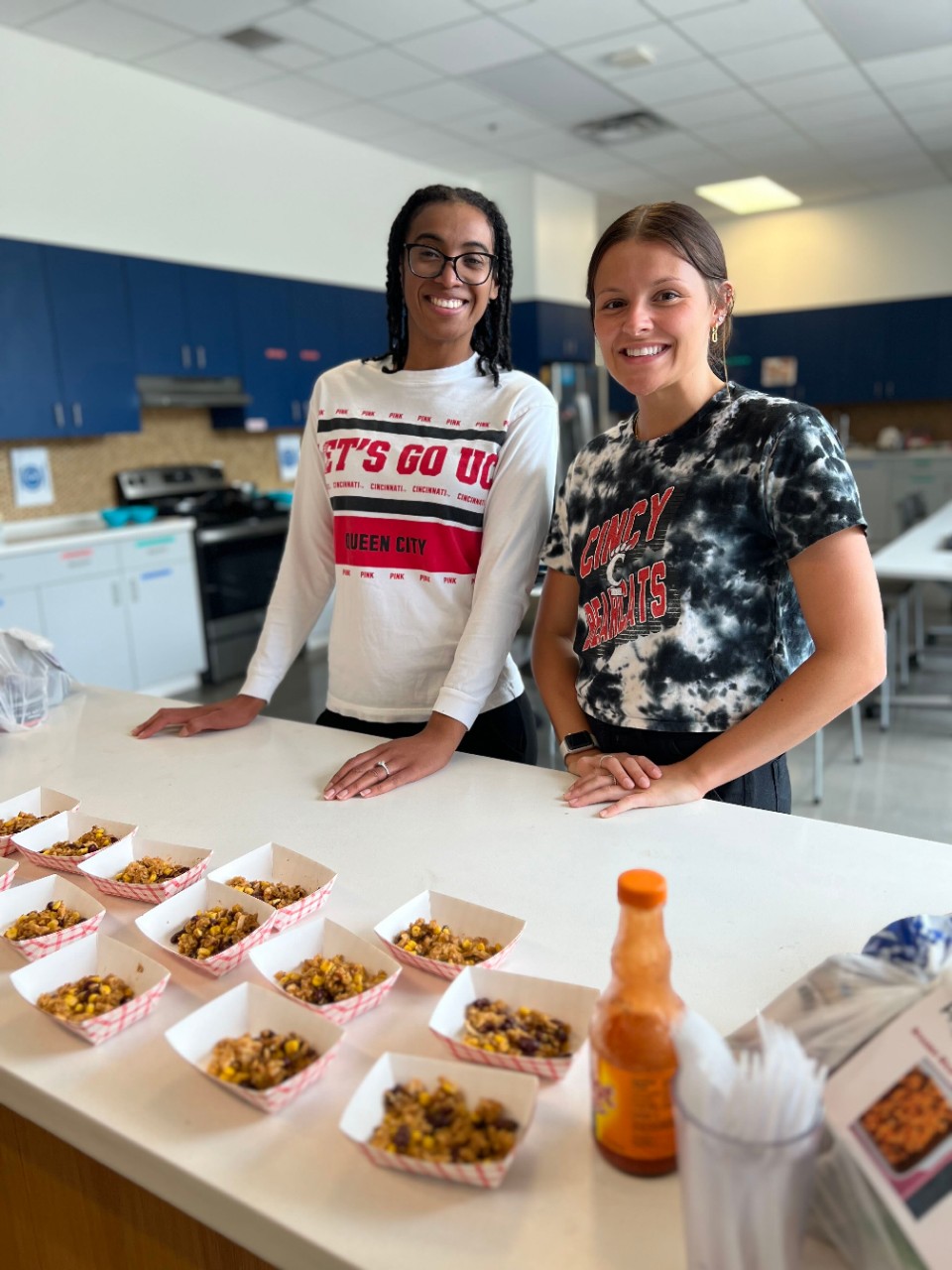Food pantry experience proves challenging, rewarding for UC students
As a graduate student studying nutrition and dietetics at the University of Cincinnati, Kindall Coley thought making nutritious and delicious meals would be easy.
But her internship at the Society of St. Vincent de Paul's Pantry4Health required problem-solving that proved more difficult — and more rewarding — than she expected.
“It’s challenging,” Coley, a sixth-year student from Cincinnati, said. “You think, theoretically, we learn all this stuff and it would be easy because we are in the nutrition space. But from the items they had provided and people’s preferences, it is challenging to make this puzzle of what should we make and what are they going to eat. We did have some misses, but we had a lot of hits in terms of the meals being good and people engaging with the meals.”
I always left feeling better than when I came. I felt like, as much as I’m here to help the neighbors, you’re also helping me. Neighbors helping neighbors.
Kassidy Meyer UC nutrition and dietetics student
Coley and Kassidy Meyer, a fellow nutrition and dietetics student in UC's College of Allied Health Sciences, spent last summer working for Pantry4Health. It's a service of St. Vincent de Paul Choice Food Pantry and St. Vincent de Paul Charitable Pharmacy that uses items from the food pantry to create healthy meals and provide nutritional education for clients, known at the pantry as “neighbors.” Both students were paid for their experience through UC’s Service-Learning Co-op program, which supports nonprofit partners in providing paid work experiences for students at little to no cost.
Meyer, a Lima, Ohio, native who will earn her bachelor's degree from UC in December, said her shifts at Pantry4Health never failed to improve her day: “I always left feeling better than when I came. I felt like, as much as I’m here to help the neighbors, you’re also helping me. Neighbors helping neighbors — it’s so true. I loved interacting with the people. Everyone had great advice and was always smiling. I felt like the days went by in a flash.”
St. Vincent de Paul is a Cincinnati-area nonprofit organization devoted to caring for low-income community members. Its Charitable Pharmacy fills more than 94,000 prescriptions annually for free, and each day, 100 people visit the group's food pantry to receive assistance.
“Unfortunately, many families in our community have limited resources and have to choose between rent, utilities, food and medicine,” said Rusty Curington, vice president of pharmacy for St. Vincent de Paul Charitable Pharmacy. “St. Vincent de Paul addresses these needs while also teaching people to utilize their available food to cook nutritious meals.”
University of Cincinnati students Kindall Coley, left, and Kassidy Meyer hold up bags with food at the Society of St. Vincent de Paul's Pantry4Health. The nutrition and dietetics students helped create healthy meals and provide nutritional education. Photo/provided
As part of their internship at Pantry4Health, Meyer and Coley helped community members choose items from the food pantry and offered advice on nutrition and food preparation. They also had conversations about everyday life, creating connections that helped them provide better service.
“Everyone wanted to make a connection as a human being,” Meyer said. “Once you made that connection with them, it was so much easier to be like, ‘Oh, you have diabetes. Do you know this option could be better than an alternative?’”
More than 60% of St. Vincent de Paul's pharmacy patients have diabetes, so meal plans had to take into account the community's needs. Meals couldn't be too high or too low in carbohydrates in order to help patients manage their blood-sugar levels.
“When we’re making meals from the pantry, they couldn’t be super high in carbohydrates or super low,” Coley said. “It really had to be a consistent number.”
UC students Kindall Coley and Kassidy Meyer helped create a recipe for salmon patties and pea salad. Photo/Society of St. Vincent de Paul
The dietitians also have to work within the constraints of the food pantry's offerings. If they had items in excess or items that were about to spoil, they had to find ways to incorporate them into meals and showcase them during monthly interactive demonstrations in the pharmacy’s teaching kitchen.
“We were always asking, ‘What do you want to see next?’” Meyer said. “‘What don’t you know how to use in the pantry? What can we research to allow these people to think outside of their comfort zone and find meals that they really do love but may have never tried before?’”
Some of the items in the food pantry weren't familiar to the clients, while others were new to Coley and Meyer. They researched recipes online and asked for suggestions from staff members and neighbors on how to incorporate unfamiliar items and make them appealing.
“When we made things that were more familiar with that population, we had more engagement, but when we made things that were unfamiliar or things they maybe didn’t like, we had less engagement,” Coley said. “We had to find that balance of things they are familiar with but make them a little bit healthier.”
The work at Pantry4Health was rewarding for both Kindall Coley, left, and Kassidy Meyer, and they said the problem-solving they learned will help them in their future careers as dietitians and in their personal lives. Photo/provided
Ideally, Meyer and Coley would have liked to incorporate more fresh fruits and vegetables into the meals. However, those items are more expensive and spoil more quickly than canned foods.
“When you’re working in a state of emergency, as a lot of people who come to St. Vincent de Paul are, first of all, we’re trying to get you out of that state of emergency, provide you with just adequate nutrition,” Meyer said.
The work at Pantry4Health was extremely rewarding for both Coley and Meyer, and they said the problem-solving they learned will help them in their future careers as dietitians and in their personal lives.
“I honestly still work on that while I’m at home because it’s very important to know how to do,” Coley said.
Featured image at top: University of Cincinnati students Kindall Coley, left, and Kassidy Meyer hold up bags with food at the Society of St. Vincent de Paul's Pantry4Health. Photo/provided
Become a Bearcat
Whether you’re a first-generation student or from a family of Bearcats, UC is proud to support you at every step along your journey. We want to make sure you succeed — and feel right at home.
Latest UC News
- UC’s Venture Lab partners with Flywheel for SustainableCincy cohortThe University of Cincinnati’s Venture Lab collaborated with Flywheel’s startup accelerator to support social entrepreneurs through its SustainableCincy program.
- Keep warm, CincinnatiAs the winter chill sets in, Hoxworth Blood Center, University of Cincinnati, is offering an extra layer of warmth for those who step up to save lives this Dec. 1-31. Those who donate blood or platelets will receive a FREE winter puffy jacket — perfect for the colder months or as a thoughtful gift for someone in need. Schedule a donation today at hoxworth.org.
- The surprising strategies animals use to survive winterNational Geographic turns to UC biologist George Uetz to learn how spiders and insects survive the long winter.
- CCM winter apparel available for purchase onlineShow your school spirit this spring with official CCM apparel! New UC College-Conservatory of Music apparel is available for purchase online. CCM's latest quarter zip and crewneck sweatshirt designs can be ordered online now through Dec. 8, 2024. You can preview both items below.
- Tennessee woman travels to UC for lifesaving careWLWT highlighted East Tennessee woman Trisha Wilhoit who traveled to the University of Cincinnati Cancer Center for treatment for her Stage 4 colon cancer and received a liver donation from her sister Camille Berkley.
- Sustaining the medical imaging professionThe University of Cincinnati's advanced medical imaging technology program is addressing the nationwide shortage of nuclear medicine and MRI technologists through innovative education, clinical partnerships and hands-on training opportunities.
















